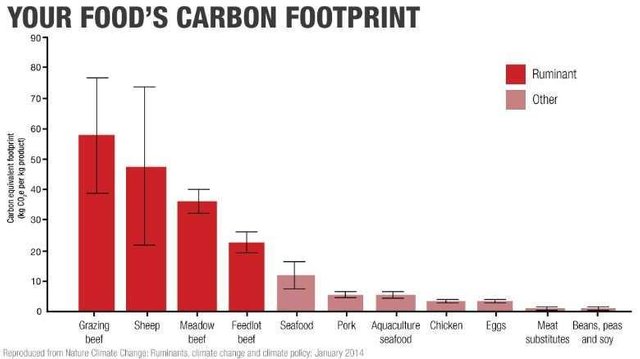Here's a letter I wrote to my former university in response to an article in their magazine about veganism and meat eating. They published a version about half the length. The chart is added for posting here.

In the decades since I was an undergraduate at UB, the problem most pressing on my mind has been how to reduce the vast environmental problems caused by the modern demand for meat. “Can we change the way we eat?” avoided the most reasonable method. Indeed veganism would be a radical shift from the status quo, an unattainable goal and not even ideal. However, why not discuss the ethical vegetarian aim of mutualist symbiosis (a relationship that benefits both or all directly species involved), with a much smaller global herd of domesticated animals?
The employment of animals in agriculture does not need to be an all-or-nothing scenario, either treating them like insentient machines or ending their existence. The austerity and effort of becoming and staying vegan is more than most people would be willing to maintain, but keeping a vegetarian diet is easy enough. Anyone can intentionally reduce their meat consumption (a “flexitarian”) if they understand the reasons for doing so. There is no need to eliminate farm animals; just diminish their numbers by reduced breeding and treat them with kindness as fellow living beings.
When enough people understand why eating meat is harmful, we will be able to collectively influence the government to eliminate subsidies to the meat production industry, including for feed production. First we must endeavor to reach the tipping point of sufficient public refusal to eat meat. The article dismissively addresses an idea of serving vegan lunches in school, but offered no reason for the dichotomy of either vegan or the status quo. Why not reduce meat portions and offer vegetarian meals?
There is apparently no reason why discouraging beef cow farming would require eliminating dairy. We need to teach students and everyone basic ecology concerning the resources required to maintain a population at various trophic levels, so people have a firm basis for making responsible decisions. The claim that kids need meat to get enough protein is false and should be retracted. If kids are getting enough calories from a balanced vegetarian or even vegan diet, they are getting enough protein. Consuming too much protein is a more of a potential health risk than getting too little.
The final paragraph of the discussion suggests people don’t need to change because the world is not in a crisis. Rather it is that too many people are unaware of the severity of the contemporary problems of agricultural resource management. We are collectively consuming resources at a reckless pace, using as much in about 8 months as nature can replenish in a year, and meanwhile the human population and economic demands are increasing. When a species overshoots the provisions of nature too much, it leads to rapid biodiversity loss and population collapse, and for us that would mean the premature deaths of a large portion of the world’s population.
The potential solution to this problem is not to rely on the government to tell us what we should do, nor is it to just expect people to respond favorably to well-meaning demands. What is required is to provide easy-to-understand scientific education related to the problem of agricultural efficiency so everyone knows why they should change their diets and why they should change government policies to help. I expect the University at Buffalo to continue doing that as well or better than when I was enrolled as a student. Thank you.
Congratulations @paul108! You received a personal award!
You can view your badges on your Steem Board and compare to others on the Steem Ranking
Vote for @Steemitboard as a witness to get one more award and increased upvotes!